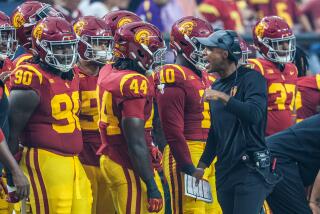Carroll is a life force at street level
It could have been a USC football game, the narrow sidelines at the Coliseum.
“Hey man, you’re doing great, keep it going,” said Pete Carroll, swooping in for a back slap as he approached Marlo Jones.
Jones could have been a quarterback.
“Coach, thanks,” he said. “It’s been tough lately . . . we’re holding on.”
But this was no game, this was not the Coliseum, and Jones was not a quarterback.
This was a recent night on a sidewalk inside South L.A.’s squalid Jordan Downs housing project, hard by the Watts Towers.
And Marlo “Bow Wow” Jones is an ex-gangster, a guy who by his account has spent seven of his 29 years in jail, now working to turn his life around.
“Pete Carroll in the ‘hood,” said a man standing near the Trojans coach, Bow Wow and me. “Man, this is crazy.”
Also, over the last couple of years, quite common.
Few know that about twice a month Carroll leaves his comfy digs at USC, hops in the back of a beaten Camry driven by a former gang member and heads to South L.A. neighborhoods where the snap of gunfire and the anguish of death occur with the steady regularity of a metronome.
These are not recruiting visits. He’s trying to save lives.
Most often, he arrives near midnight and walks shadowy streets with that familiar, electric strut, surrounded by little boys, grandparents, crack heads and gang toughs. He empathizes, listens, encourages, laughs. He talks about jobs and kids and marriage, about perspective and courage, about how difficult it must be to be caught in the madness of the streets.
He realizes that some might think he’s a fool, that some might say he should pay no mind to gang members. Naysayers do not stop him.
“I don’t go to judge . . . just to show that someone cares,” he said. “Just go to give people here a little hope. . . . Get folks to step back and think. Hopefully, get them to change.”
Five years ago, moved by news of murders near USC’s campus, Carroll formed a foundation called A Better LA, dedicated to ending inner-city violence. He hoped to use the self-improvement thinking he’s long leaned on in coaching to help people in poor and dangerous neighborhoods.
He struggled to gain traction. He didn’t have much in the way of relationships with the gang members he hoped to influence. Then Carroll met Bo Taylor, a former gang member who long ago had dedicated his life to turning street toughs to the straight and narrow. Carroll and Taylor grew close. To be truly effective, Taylor told the coach, Carroll would need to learn more about the dreams and fears of people living in forgotten neighborhoods. The only way to do that would be to become a regular at the hot spots.
Carroll’s foundation now helps fund Taylor’s violence prevention nonprofit, Unity One, and several like it. They have a strategy: In the hot spots, identify the charismatic gang and neighborhood leaders, the ones everyone follows. Befriend them, gain their trust, help them change if needed, try to get them to take classes that teach everything from mediation to positive thinking. Even pay the ones who are most dedicated, turning them loose to help educate and prod.
Bow Wow is on the payroll. Among the Grape Street Crips, his word matters. On this night, well before we arrived, Taylor had called Bow Wow to make sure we would be welcomed. We were granted entry -- on the streets, a ghetto pass -- but we drove to Watts knowing there are no sure things. At any moment, guns could be pulled, shots fired. Over the last few weeks, we would come to find, four of Bow Wow’s friends had been killed near Jordan Downs.
We wound through the streets of South L.A., Taylor’s brother, Le’Chein, at the wheel, and pulled to a stop in a foggy parking lot. Taylor got out of the car first, instructing us to wait while he made sure the quartet of suspicious men at the corner knew who we were.
Carroll couldn’t help himself. He opened his door and popped out. The guys at the corner spotted him. Immediately, they relaxed. “Pete, Pete, hey Pete, my man!” they shouted.
We stood in a dark courtyard, littered with shards of broken glass. Carroll was quickly surrounded by a dozen people, some wanting to shake his hand, some staring in disbelief, some wanting to tell him a story. The coach heard talk of addiction, jail, police, prostitution and the Bible. He heard about the Bruins and Notre Dame and Neuheisel.
A blue van drove up. Nobody recognized it; most everyone eyeballed it, worried. One beat. Two beats. The van eased away, the air felt a little lighter. Through all of this, Carroll never flinched, never looked uncertain or fearful. Knowing he’d be leaving soon, he sidled up to Bow Wow, who has a calm, all-knowing countenance.
The neighborhood, Bow Wow said, was tense. There’d been a killing, everyone knew the victim and now there were rumors of possible retaliation.
“It’s like a black cloud hanging over us,” Bow Wow muttered. “But we’re glad you’re out here, Pete. It means a lot to the people here.”
Carroll assured that he wanted to be at Jordan Downs, especially now. He invited everyone to a Trojans scrimmage as his guest. He wanted them to get away from the projects, if only to feel a bit less stress for an afternoon.
This was a weeknight in the middle of spring football practice, so Carroll couldn’t stay as long as he often does. He began climbing into the back seat of the Camry, looking as if he wished he could stay longer.
“Hey Pete, Pete,” came a chorus of voices. “Come back real soon!”
“Just keep getting after it,” he replied. “I’ll be back.”
------
Last month in this space I wrote about Jamiel Shaw, an L.A. High football star whose bright future was snuffed out in a drive-by shooting. I pledged to do a bit more reporting about the intersection of sport and the inner city and asked readers to get involved in our troubled neighborhoods -- by tutoring, supporting charities, maybe pressing politicians for change. Most of all, I argued, we need to care more, even about people in gangs. They can change. We can help them.
After he read what I’d written, Pete Carroll invited me to come with him to the ‘hood. Now, I’m not recommending that you do as he does, putting yourself in harm’s way for the cause. But next time you consider whether you should get involved, or whether your efforts would be worth it, think of this column and Carroll down at Jordan Downs. (You can also find out more about his foundation by visiting abetterla.com.)
If the USC coach -- wealthy, famous, dealing with off-the-charts job pressure -- can find a way to help calm the violence that plagues this city, any of us can.
--
Kurt Streeter can be reached at [email protected]. To read previous columns by Streeter, go to latimes.com/streeter.
More to Read
Go beyond the scoreboard
Get the latest on L.A.'s teams in the daily Sports Report newsletter.
You may occasionally receive promotional content from the Los Angeles Times.







